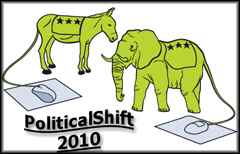
The biggest story of the U.S. midterm election has been the growing influence of the Tea Party movement. Since their first rallies in early 2009, these vocal, visible conservatives have succeeded in shifting the center of American political discourse to the right. This election cycle, Tea Partiers have gone a step further, successfully backing primary challengers against moderate Republicans like Delaware’s Mike Castle. So how has this confederation of online, conservative activists used new media to build their growing political base?
Think Local; Organize Nationally
First and foremost, the Tea Party movement has succeeded by connecting local groups to the national conversation.
“I didn’t really start using Facebook and Twitter until I got involved with the Tea Party movement,” said Ana Puig, the 38-year-old leader of Pennsylvania’s Kitchen Table Patriots (KTP).
Puig said much of KTP’s online organizing would not have been possible without the help of two prominent, national conservative organizations: FreedomWorks and American Majority. These well-financed operations provide local Tea Party groups with the new media training and focus group-tested political messaging needed to get results.

Using what she learned from these national organizations, Puig and co-founder Anastasia Przybylski set up the KTP’s rudimentary website, which has proved effective in establishing the group’s digital presence and in attracting new members. Puig said KTP has an email list of a couple thousand people and has attracted over 400 fans to its Facebook page since she created it a month ago.
These personalized digital resources have enabled KTP to stage dozens of rallies since it was founded in February 2009. They’ve also organized an online boycott of Dawn after it advertised during a MSNBC Tea Party documentary and are currently running get-out-the-vote operations for conservative candidates across the state.
Digital Tools
Brendan Steinhauser, FreedomWorks’ director for federal and state campaigns, hinted at another way the Tea Party has grown its online political clout: By sharing digital tools.
“We see our new model at FreedomWorks as a service center for the grassroots,” he explains.
This approach is based in part on the success Steinhauser had using Yahoo Groups and viral videos to revive the University of Texas chapter of the state’s Young Conservatives organization in the years before YouTube was launched or Facebook became an open network. After his graduation in 2005, Steinhauser used the same tools to help found the Young Conservatives of California. He also published a book about his campus organizing experiences, The Conservative Revolution, and launched a blog with the same name.
Steinhauser was one of a handful of FreedomWorks staffers who have shown Puig, and many others like her, the digital ropes.
“A lot of it is training,” Steinhauser explained. “Most of these people are new to politics.”
In addition to seminars on the background and basics of political campaigning — from the tactics of the American civil rights movement to tips on how to stage an interesting meeting — FreedomWorks has sessions on social media.
“It’s very basic stuff, but it goes a long way toward making an impact” with the older members of the Tea Party movement, he said.
FreedomWorks also offers more sophisticated digital resources to its network of 650,000 online conservative activists. Puig initially contacted the organization to have one of the KTP’s rallies listed on a national Google Map that FreedomWorks created to share information about local Tea Party events. Steinhauser’s group also helped fire-charge the Congressional town halls in summer of 2009 by featuring on their website an “August Recess Action Kit” to aid supporters in exposing “the real intentions and the economic ramifications of the…health care reform legislation on the table,” as Mother Jones reported at the time.
Annotated Map
For the 2010 midterms, FreedomWorks created an interactive, nationwide map highlighting candidates in races where the organization is offering its endorsement (and the generous financial support of an affiliated political action committee). Registered users can log into the map to learn more about FreedomWorks’ official views on the candidates, or to add their own personal comments and ratings on the politicians.

Steinhauser said this user feedback is among the factors his group takes into account when deciding whether or not to support candidates that it considers to have questionable conservative credentials. One example of this process in action was in California, where FreedomWorks only recently endorsed the GOP’s Senatorial nominee, Carly Fiorina.
The organization is also investing in creating new digital activism tools.
“We will have a FreedomWorks app after the election,” Steinhauser said.
According to him, this organizing application will integrate with Facebook and other social networks to lower the barriers for communication and collaboration between individual Tea Parties.
“The hardest part about a new technology is trying to get someone to use it,” he said.
Steinhauser expects the “Grassroots Action Center,” as FreedomWorks is calling the new project, to go live in January or February. “GAC will allow us to be a bigger hub for these different groups,” he predicted.
Divisive Tactics?
While the Tea Party has been criticized by some on the left for being a very vocal minority and out of the mainstream, they have succeeded in getting previously apathetic Americans involved in politics. Many critics have said the Tea Party movement sometimes lacks a coherent message and appears to be unorganized and chaotic.
American Majority is one of a few national umbrella groups trying to change that. The conservative activism education and organizational training they provide have been also played an essential role in the Tea Party’s digital success. This strategy includes everything from traditional guidance and financial support for get-out-the-vote operations — like the one Ana Puig and the Kitchen Table Patriots are currently conducting with American Majority in Pennsylvania — to more innovative (and arguably objectionable) online activism.
Below is footage from an American Majority seminar, featured in the newly released documentary “(Astro)Turf Wars”. In the brief clip, the group’s trainer encourages activists to game the ratings systems on sites like Rotten Tomatoes and Amazon.
“Literally 80 percent of the books I put a star on, I don’t read,” the American Majority employee brags. “That’s how you control the online dialogue.”
At one point in the video, the trainer connects the patriots of the American Revolution with Tea Partiers today.
“We become digital activists,” he said. “We identify the medium, we learn the medium, we manipulate the medium. It was printing presses then, it’s the Internet now.”
These “guerrilla tactics,” as the trainer described them, are reminiscent of the secret online campaign by the Digg Patriots to “bury” or censor progressive stories on the social news site, and to promote conservative content. Before the release of this new documentary about right-wing activism, Greenpeace online community organizer Chris Eaton pointed to the Digg group as part of what he referred to as the right-wing “echo chamber.” On Digg — and apparently Rotten Tomatoes, Amazon, and other social sites — Tea Partiers “hear what to say and repeat it often,” he said.
Whether or not you agree with what they’re saying, there’s no denying that the Tea Party movement has effectively deployed digital technology to increase their size and political influence. But until Election Day comes to a close, we won’t know for sure how receptive the wider voting public is to their strongly conservative messages.
Corbin Hiar is the DC-based associate editor at MediaShift and climate blogger for UN Dispatch and the Huffington Post. He is a regular contributor to More Intelligent Life, an online arts and culture publication of the Economist Group, and has also written about environmental issues on Economist.com and the website of the New Republic. Before Corbin moved to the Capital to join the Ben Bagdikian Fellowship Program at Mother Jones, he worked a web internship at the Nation in New York City. Follow him on Twitter @CorbinHiar.

